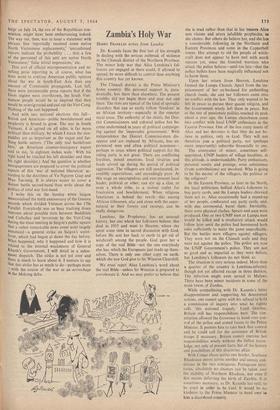Zambia's Holy War
HARRY FRANKLIN writes from Lusaka:
Dr. Kaunda faces the first test of his strength in dealing with the serious outbreak of violence in the Chinsali district of the Northern Province. The minor holy war that Alice Lenshina's fol- lowers are engaged in there could, if allowed to spread, be more difficult to control than anything this country has yet known.
The Chinsali district is the Prime Minister's home country. His personal support is, para- doxically, less there than elsewhere. The present troubles did not begin there and may not end there. The riots are typical of the kind of sporadic disorders that can so easily follow 'freedom' in an African territory—especially in the remoter rural areas. The authority of the chiefs, the Dist- rict Commissioners and colonial police has be- come undermined in years of political campaign- ing against the 'imperialist government,' With independence the District Commissioners dis- appear and are replaced by Africans, less, ex- perienced men and often political nominees— perhaps in areas where political support for the ruling party is not great. There are conflicting loyalties, mixed emotions, local rivalries and feuds stirred up during the period of political aggression. The villagers are still uneducated, in- credibly superstitious, and exceedingly poor. At this stage an unscrupulous and ever-present local leader, political or other, can stir up a clan, or even a whole tribe, to a violent outlet for frustration and bewilderment. When religious fanaticism is behind the revolt—this among African tribesmen, afar and alone with the super- natural in their forests and swamps, can be really dangerous.
Lenshina, the Prophetess, has an unusual history, but one which her followers believe. She died in 1953 and went to Heaven, where she spent some time in sacred discussion with God, before He sent her back to earth to get rid of witchcraft among the people. God gave her a copy of the real Bible—not the one everybody else has, which the Europeans just made up them- selves. There is only one other copy on earth, which she saw God give to Sir Winston Churchill.
We must reject Alice Lenshina's word about the real Bible—unless Sir Winston is prepared to corroborate it. And we may prefer to believe that she is mad rather than that in her trances Alice sees visions and utters infallible prophecies, as she claims. But others do believe her, and she has a considerable following in the Northern and Eastern Provinces and some in the Copperbelt towns. Her attempt to rid the people of witch- craft does not appear to have met with much success yet, since the frenzied warriors who attack the police believe—until too late—that the police bullets have been magically influenced not to harm them.
Upon her return from Heaven, Lenshina formed the Lumpa Church. Apart from the im- prisonment of her ex-husband for embezzling church funds, she and her followers came into no conflict with the law. They only wanted to be left in peace to pursue their quaint religion, and the Government wisely left them in peace. But as the rise of passionate politics reached its peak about a year ago, the Lumpa churchmen came into conflict with local UN1P enthusiasts in the Eastern Province. One of the less crazy tenets of Alice and her devotees is that they do not be- lieve in politics, only in God. They will not therefore join a political party, nor (perhaps more importantly) subscribe financially to one.
The annoyance of minor, sometimes self- appointed, UNIP leaders of village localities, at this attitude, is understandable. Party enthusiasm, personal vanity and prestige, even subsistence (from contributions) are involved. Who is going to be the master of the villagers, the politico or the religioso?
In the Eastern Province, as later in the North, the local politicians bullied Alice's followers to buy party cards, and the Lumpa leaders chivvied them not to. Alice occasionally had a round-up of her people, confiscated any party cards, and, with due ceremonial, burnt them. Inevitably, there were physical clashes. Spears and axes were produced. One or two UNIP men or Lumpa men would be killed and a retaliatory attack would follow later until the police had hammered both sides sufficiently to make the game unprofitable. But the battles were villagers against villagers. They were not on the Chinsali scale and they were not against the police. The police are now the UNIP Government's police. They are just as good and as impartial as they were before, but Lenshina's followers do not think so.
The situation is very serious indeed. More than a quarter of the country is Lenshina-infected, though not yet affected except in three districts. The infection might even spread to Malawi. There have been minor incidents in some of the main towns of Zambia.
While sympathising with Dr. Kaunda's bitter disappointment and supporting his determined actions, one cannot agree with his refusal to hold a commission of inquiry into what he rightly calls 'this national tragedy.' Until October, Britain still has responsibilities here. The con- stitution allowed the Governor to hand over con- trol of the police and armed forces to the Prime Minister. It permits him to take back that control and he could call for the assistance of British troops if necessary. Britain cannot exercise her responsibilities wisely without the fullest know- ledge, not only of present facts, but of the history and possibilities of this disastrous affair.
With Congo chaos across one border, Southern Rhodesian unrest across another and uneasy con- ditions in the two contiguous Portuguese terri- tories, absolutely no chances can be taken over the stability of Northern Rhodesia, not even if this means, deferring the birth of Zambia. It .is sometimes necessary, as Dr. Kaunda has said, to be cruel in order to be kind. It would be no kindness to the Prime Minister to hand over to him a disordered country.






























 Previous page
Previous page